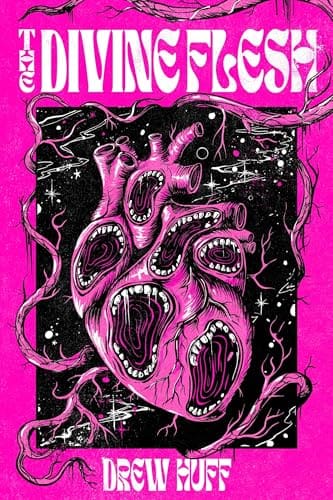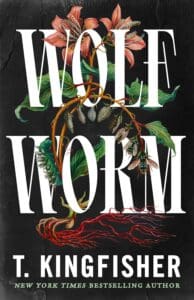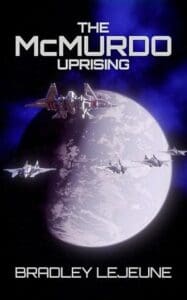
Synopsis:
Jennifer Plummer and the Divine Flesh have exactly three things in common:
1) they’re trapped inside Jennifer’s body; 2) they despise each other; and 3) they’re in love with Daryl Plummer, Jennifer’s ex-husband. But when Jennifer takes an experimental wonder drug to free herself from the Divine Flesh’s control, it only makes things worse. Expelled from Jennifer’s body, the Divine Flesh can now “love” everyone in existence to death, which in this case, means being assimilated forever into the beast. With time running out, it’s somehow up to Jennifer and Daryl to save the universe from complete and total destruction. Can a dysfunctional drug mule and an electrician from rural Idaho stop the cosmic abomination before it’s too late? Jennifer thinks, maybe.
Review:
Ichor-dripping, tendon-snapping and mayhem-filled, Drew Huff’s “The Divine Flesh,” is, like the rest of her work thus far, ambitious, bizarre, intoxicating and whilst fantastical in many respects, all too relevant. Robert Louis Stevenson’s “The Strange Case of Dr. Jekyll and Mr Hyde,” turns cosmic in this hallucinatory yet philosophical, and gloopy epic. Huff comments on addiction, automatism, and the engineering of pain and suffering, Drew is an author who is doing something different- and I like it. “The Divine Flesh,” (D.F for short) will love you, assimilate and mutate you, turn you to ash. Take a deep breath, allow it to embrace you with loving tendrils and prepare to be swallowed whole by “The Divine Flesh,” March 3rd- Dark Matter Ink- prepare to be unmade.
We follow Jennifer Plummer. She is an addict, and whilst technically still married, doesn’t talk to her husband Daryl. To be fair to him, her drug trafficking could be viewed somewhat as a turn-off, especially considering it’s dragged him into all sorts of legal trouble, but to be fair to her, she’s sharing her body with a cosmic horror Goddess. One who despises her, loves her husband, and is unleashed every time Jennifer dies (which happens a whole lot). The havoc “The Divine Flesh,” wreaks when contained is earth-shattering- could you imagine how dire the consequences would be should she be released? Expelled? Free to destroy, mutate and love unchecked? That would be very, very bad.
Before we dive head first into some of the themes, we should touch on the writing. “The Divine Flesh,” is a book that pulses, squirms and mutates, it beats and throbs with a disturbing vitality. Huff’s signature stream of consciousness style writing is a divisive one, but here especially it works fantastically. The plot (in all its unhinged beauty) flows with an infectious cadence. It is horror at its most viscous, experimental and strangely beautiful. Fans of the lyrical prose of authors like Joe Koch, Kathe Koja, and Sofia Ajram may find themselves a new favourite in Huff.
The body horror can only be described as an assault. A visceral invasion of the mind and body. But carnage aside, the single most scary aspect of this book is the lack of control the protagonist experiences. I feel an anecdote brewing. This year, whilst already suffering sun-stroke, I took one too many sea-sickness tablets on a ferry, and for the duration of that ride I was hot, uncomfortable and drifting in and out of consciousness. I was lucid, aware that I wasn’t functioning quite right, but not quite in control enough to do anything. Ask for water, open a window, wave over a staff member. I felt trapped, just observing a dull looping film (one that followed the back of the seat in front of me). That sense of helplessness is a terror that Huff amplifies and exploits in part 1 of the novel. When “The Divine Flesh,” takes over Jennifer’s body, Jennifer is systematically dismantled, she shuts her senses off one by one. Jennifer knows that her cosmic eldritch goddess counterpart doesn’t play nice, she knows she’ll wake to a massacre she had no say in. As opposed to the massacre itself it is the knowledge that something else is moving her limbs, speaking in her voice, fucking her husband. I believe this, ultimately, to be a grim, cosmic metaphor for addiction. The forced surrender of autonomy, the utter horror of watching yourself make choices you didn’t choose, and may live to regret.
In one particularly fever-dreamish passage, told from the perspective of “The Divine Flesh,” we travel back to the dawn of time. There is nothing. We are forced ultimately to reckon with the fact that the majority of the anguish that is suffered is not the fault of some cosmic force, or unavoidable disaster. The worst of human suffering is not an inevitability, but designed, perpetuated, tolerated. Elected? In conjunction with various other aspects of the story, ones which I can not find the clarity, space or ability to explain, “The Divine Flesh,” and the loss of automatism it explores on a macro scale, feels particularly apt today.
Grotesque and magnificent, this book will seep into your skin, filter into your bloodstream and rewire your neurons. I’ve never been one to lie to you, it is a difficult time- you’ll have questions, you’ll probably get confused, it’s a book that makes you work hard and think harder, but, if you’re willing to do that, then you’ll love “The Divine Flesh,” and it will love you back.









Leave a Reply